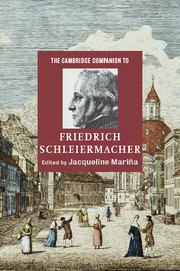Book contents
- Frontmatter
- Introduction
- Part I Schleiermacher as Philosopher
- Part II Schleiermacher as Theologian
- 6 Shaping an academic discipline: the Brief Outline on the Study of Theology
- 7 Sin and redemption
- 8 Christology and anthropology in Friedrich Schleiermacher
- 9 Schleiermacher’s understanding of God as triune
- 10 Providence and grace: Schleiermacher on justification and election
- 11 Schleiermacher’s Christian Ethics
- 12 Schleiermacher’s exegetical theology and the New Testament
- Part III Culture, Society, and Religion
- Schleiermacher Biography
- References
- Index
10 - Providence and grace: Schleiermacher on justification and election
from Part II - Schleiermacher as Theologian
Published online by Cambridge University Press: 28 August 2006
- Frontmatter
- Introduction
- Part I Schleiermacher as Philosopher
- Part II Schleiermacher as Theologian
- 6 Shaping an academic discipline: the Brief Outline on the Study of Theology
- 7 Sin and redemption
- 8 Christology and anthropology in Friedrich Schleiermacher
- 9 Schleiermacher’s understanding of God as triune
- 10 Providence and grace: Schleiermacher on justification and election
- 11 Schleiermacher’s Christian Ethics
- 12 Schleiermacher’s exegetical theology and the New Testament
- Part III Culture, Society, and Religion
- Schleiermacher Biography
- References
- Index
Summary
There is only one, eternal and general decree to justify humans for Christ’s sake. This decree is identical with the decree to send Christ . . . and this again is simply one with the decree to create the human race, seeing that in Christ human nature is first brought to completion.
(CF, § 109.3)In any presentation of Christian theology that aspires to be systematic, the order of topics is by no means a matter of indifference: the sense of a doctrine is, at least in part, a function of its location. Anyone who has looked into some of the leading works of Protestant dogmatics may be puzzled to find “providence,” “justification,” and “election” linked in a single discussion. At first sight, they seem to make an odd association of three theological terms that belong in different parts of a system. (“Grace,” the second term in our title, is likely to be ubiquitous in Protestant theology rather than reduced to a particular locus.) Providence has always appeared early in the order of topics, under the doctrine of God, and justification comes much later under “soteriology,” the subjective appropriation of the redemption won by Jesus Christ. The placement of election has varied. In the definitive edition of his Institutes (1559), John Calvin took the unusual step of moving the discussion of election (or predestination) from its customary attachment to the doctrine of God's providence and attached it instead to justification by faith and prayer as the principal exercise of faith; there it served to answer the question why one individual comes to faith, another doesn't. Friedrich Schleiermacher, though he placed providence and justification in their conventional systematic locations, postponed election still further than Calvin, placing it under ecclesiology, the doctrine of the church. Why, then, Schleiermacher on providence, justification, and election?
- Type
- Chapter
- Information
- The Cambridge Companion to Friedrich Schleiermacher , pp. 189 - 208Publisher: Cambridge University PressPrint publication year: 2005
- 1
- Cited by



